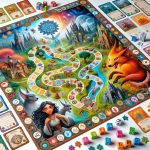Do strategy board games help kids develop important skills for their cognitive and emotional growth? Critical thinking, problem-solving, and decision-making are crucial abilities that children need to cultivate as they grow.
This article aims to explore the benefits of strategy board games in nurturing these skills in kids. By understanding the educational value of these games and their role in enhancing social and emotional development, parents and educators can make informed decisions about integrating them into a child’s playtime.
Strategy board games offer more than just entertainment; they provide an avenue for children to apply critical thinking in a fun and engaging way. As such, kids can learn valuable life skills such as strategic planning and adaptability while having fun with their peers or family members. In this article, we will delve into the significance of critical thinking in child development and how strategy board games contribute to honing this essential skill.
In addition to building critical thinking abilities, strategy board games have educational value that extends beyond the classroom. These games offer a hands-on approach to learning that enhances problem-solving skills by presenting players with various challenges and obstacles to overcome. Through this process, children not only develop problem-solving strategies but also learn the importance of perseverance and patience – qualities that are instrumental in facing real-life challenges.
Understanding the Importance of Critical Thinking in Child Development
Critical thinking is an essential skill for children to develop as it allows them to analyze, evaluate, and solve problems effectively. Strategy board games play a crucial role in fostering critical thinking skills in kids. By engaging in these games, children are presented with challenges that require them to think strategically, weigh their options, and make informed decisions.
The educational value of strategy board games cannot be overlooked. These games offer a hands-on approach to learning and encourage children to think critically about their next move. Whether it’s calculating the best way to reach a goal or anticipating an opponent’s strategy, kids are constantly exercising their critical thinking abilities while playing these games.
There are many strategy board games available that cater to different age groups and skill levels. Some popular options include Settlers of Catan, Ticket to Ride, and Chess.
Parents and educators should consider the developmental stage of the child and choose games that are challenging enough to promote critical thinking but not so difficult that they become frustrated. Additionally, it’s important to select games that align with the child’s interests as this will keep them engaged and motivated to think critically while playing.
Overall, strategy board games are an effective tool for nurturing critical thinking skills in children. As parents and educators introduce these games to kids, they can rest assured knowing that they are providing opportunities for cognitive growth and development through fun and interactive gameplay.
The Educational Value of Strategy Board Games
Strategy board games have long been recognized for their educational value, especially when it comes to children. These types of games are not only entertaining, but they also provide numerous benefits that can contribute to a child’s cognitive development. One of the key educational values of strategy board games is their ability to teach critical thinking skills.
By engaging in strategy board games, children are able to practice critical thinking as they plan and make strategic moves in the game. This type of cognitive exercise helps develop their problem-solving abilities, decision-making skills, and logical reasoning. Through these games, kids learn how to anticipate consequences and think ahead, which are essential skills that can be applied in various real-life situations.
Furthermore, strategy board games help kids understand complex concepts such as cause and effect, spatial awareness, and pattern recognition. This type of learning goes beyond what traditional classroom settings can offer and provides a hands-on approach to developing important cognitive skills. As a result, children who regularly play strategy board games may find themselves better equipped to tackle academic challenges and excel in their studies.
Enhancing Problem-Solving Skills Through Board Games
Strategy board games offer children the opportunity to enhance their problem-solving skills in a fun and engaging way. By playing these games, kids are challenged to think critically and strategically in order to achieve their goals, whether it’s taking over territory, capturing opponents’ pieces, or reaching the finish line first. This constant exercise of the brain helps develop the analytical and logical thinking abilities of children, which can be beneficial in various aspects of their lives.
According to a study published in the journal Developmental Psychology, children who regularly engage in strategy board games show improvement in their problem-solving skills compared to those who do not. The study also found that these kids were more adept at finding solutions to complex challenges presented to them. This highlights the positive impact that strategy board games can have on cognitive development in children.
Furthermore, strategy board games also provide an avenue for kids to learn from trial and error. They get to test out different strategies and observe the outcomes, allowing them to understand cause-and-effect relationships and make better decisions in future moves. This hands-on approach to problem-solving can help kids become more adaptable and resilient when faced with difficulties both on and off the game board.
| Benefit | Data |
|---|---|
| Improved problem-solving skills | Study published in Developmental Psychology shows kids who play strategy board games exhibit enhanced problem-solving abilities. |
| Hands-on learning | Kids learn from trial and error experiences while playing strategy board games, improving their decision-making skills. |
Social and Emotional Development Through Strategy Board Games
Strategy board games do help kids in their social and emotional development. These types of games provide an opportunity for children to learn important social skills such as patience, cooperation, and sportsmanship. By playing with others, kids also develop empathy and learn to understand the feelings and perspectives of their peers. Additionally, strategy board games can help children build strong relationships with their friends and family members, as they engage in friendly competition and work together towards a common goal.
Moreover, strategy board games can also support the emotional development of children by teaching them how to manage their emotions during gameplay. For example, when faced with challenges or setbacks in a game, kids have the opportunity to practice resilience and perseverance. They can learn how to cope with disappointment and frustration in a supportive environment, which can be beneficial for their emotional well-being.
In summary, the social and emotional benefits of strategy board games for kids are numerous. From learning essential social skills to developing emotional resilience, these games provide a valuable platform for children to grow and thrive in their interpersonal relationships and overall emotional health. When selecting strategy board games for kids, consider those that promote cooperation, communication, and positive conflict resolution. With the right games, children can enjoy both entertainment and growth in their social and emotional development.
- Cooperative board games for teamwork
- Games that encourage communication and collaboration
- Board games with themes of empathy and understanding
Building Concentration and Focus in Children
Strategy board games can play a crucial role in building concentration and focus in children. These games require players to pay attention to details, think critically, and plan their moves carefully. As a result, children who engage in strategy board games often develop the ability to concentrate for longer periods of time, leading to improved focus in other areas of their lives, such as academics and extracurricular activities.
Research has shown that playing strategy board games can help children improve their attention span and stay focused on tasks for extended periods. This is particularly beneficial in today’s digital age, where distractions are abundant. By engaging in gameplay that requires sustained mental effort, children can enhance their ability to stay concentrated despite external stimuli.
In addition to improving concentration and focus, strategy board games also promote the development of strategic thinking and decision-making skills. As children work through various game scenarios and contemplate different options, they naturally build the capacity to concentrate on the task at hand while considering potential outcomes and making informed choices.
| Benefit | Details |
|---|---|
| Concentration Improvement | Children can improve their attention span through sustained mental effort during gameplay |
| Enhanced Strategic Thinking | Playing board games promotes critical thinking and planning skills, leading to improved concentration |
| Improved Decision-Making | Engaging in gameplay helps children develop the ability to concentrate while contemplating various options and making informed choices |
The Role of Strategy Board Games in Encouraging Decision-Making Skills
Developing Analytical Thinking
Strategy board games require kids to analyze different scenarios, predict outcomes, and make decisions based on their assessment of the situation. This process helps children develop their analytical thinking skills as they consider the possible moves and their potential consequences. By engaging in these types of games, kids can learn to weigh options and make informed decisions, which ultimately contributes to their overall decision-making abilities.
Learning Risk Assessment
One of the key aspects of strategy board games is understanding risk and reward. Children who play these games learn to assess the risks associated with each move they make on the board and evaluate whether it aligns with their overall game strategy. This skill of risk assessment is transferable to real-life decision-making situations, where kids can apply the lessons learned from board games to evaluate potential risks in various scenarios.
Exercising Cognitive Flexibility
Engaging in strategy board games encourages children to think flexibly and adapt their strategies based on changing circumstances during gameplay. This helps them develop cognitive flexibility, which is the ability to shift their way of thinking when faced with new information or challenges. The process of making decisions within a dynamic and evolving game environment can equip kids with the skills needed to adapt and make effective decisions in different contexts outside of the game.
Tips for Choosing the Right Strategy Board Games for Kids
Age-Appropriate Games
When choosing strategy board games for kids, it’s essential to consider the age appropriateness of the game. Younger children may not have the attention span or understanding required for complex strategy games, so it’s important to select games that are suitable for their age and developmental level. Look for games that are labeled with the appropriate age range, and consider the cognitive abilities of your child when making your selection.
Educational Content
Consider the educational value of the strategy board game you choose for your child. Many board games offer opportunities for learning about math, language, history, and other subjects while also developing strategic thinking skills. Look for games that align with what your child is learning in school or that introduce new concepts in an engaging way.
Level of Complexity
It’s crucial to consider the complexity of a strategy board game when choosing one for your child. Some children may become frustrated or lose interest if a game is too difficult for them to understand or play. On the other hand, older children may find simple games boring and unchallenging.
Take into account the complexity level that will be engaging and enjoyable for your child without being overwhelming. As they grow and develop, you can gradually introduce more complex games to continue challenging their strategic thinking skills.
Conclusion
In conclusion, the evidence overwhelmingly supports the idea that strategy board games are incredibly beneficial for children. These games not only provide entertainment, but also play a crucial role in fostering cognitive development. By engaging in these games, children are able to enhance their critical thinking skills, problem-solving abilities, and decision-making capabilities. The educational value of strategy board games cannot be understated, as they help children develop important life skills that will serve them well into adulthood.
Furthermore, strategy board games have been found to have a positive impact on the social and emotional development of children. These games often require cooperation and communication among players, leading to improved social skills and empathy. Additionally, the ability to focus and concentrate during gameplay is another valuable skill that children can cultivate through these board games.
It is essential for parents and educators to recognize the immense benefits that strategy board games can offer to children. When choosing board games for kids, it is important to select those that are age-appropriate and align with their interests. By incorporating strategy board games into a child’s routine, whether at home or in an educational setting, we can contribute to their overall development and prepare them for future challenges.
Frequently Asked Questions
Are Strategy Board Games Good for Your Brain?
Strategy board games are indeed good for your brain. They require critical thinking, problem-solving, and decision-making skills, which can help improve cognitive function. These games also encourage strategic planning and forward thinking, contributing to mental stimulation and development.
Are Board Games Good for Child Development?
Board games can be beneficial for child development in several ways. They promote social interaction and communication skills as children learn to take turns, follow rules, and work together with others. Additionally, board games can enhance cognitive skills such as counting, pattern recognition, and memory.
Do Board Games Help With Learning?
Board games are effective tools for learning in various ways. They can teach important concepts such as math, reading, and language skills through gameplay. Additionally, board games often encourage creativity and imagination while fostering critical thinking and problem-solving abilities in an engaging manner. Overall, they provide a fun and interactive way for individuals to learn and develop new skills.

I love playing all kinds of games – from classics like Monopoly to modern favourites like Ticket to Ride.
I created this blog as a way to share my love of board games with others, and provide information on the latest releases and news in the industry.





